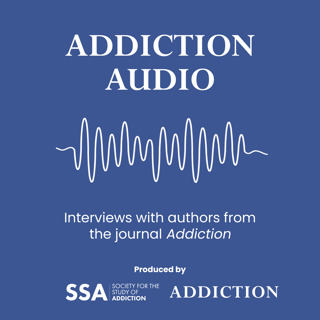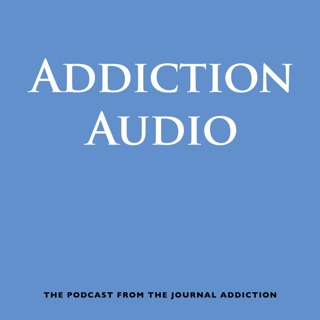
Perspectives on gambling from 1561 with Louise Nadeau
In this episode Ben Scher talks to Professor Louise Nadeau about her recent article anaysing the content of a Latin-language treatise on gambling addiction written nearly 500 years ago. Ben and Louise discuss the medical model of gambling and issues of historic identification. They unpick how the original authors wrote about the medical model of addiction long before it was called that. Parts of the treatise refer to non-problematic gambling - noting that there was a small population who had problems. There are also references to gambling harms and models of treatment that go back to the 6th century AD. This podcast offers a fascinating historical insight in a way that illuminates our current understanding of addiction and co-occurring disorders."So here was this person in 1561 who was thinking of erroneous cognitions who thought of genetic vulnerability - all that at the end of the Renaissance."Original article: A re-discovered treatise from 1561 by Louise Nadeau and Marc Valleur. Published in Addiction (2023) Hosted on Acast. See acast.com/privacy for more information.
28 Heinä 202323min

Risk of bias in tobacco cessation trials with Jamie Hartmann-Boyce
In this episode, Chloe Burke talks to Dr Jamie Hartmann-Boyce about new guidance from the Cochrane Tobacco Addiction Group (TAG) on assessing and minimising risk of bias in tobacco cessation trials. Jamie explains some of the key challenges in this area and explains some of the primary sources of bias that authors need to be aware of when analysing tobacco cessation trials. This article was published as part of Addiction's Methods and Techniques series."We wanted to do this to make sure people were assessing it [risk of bias] well, but also to put in some sort of consistency across our reviews so that the different author teams working on them were broadly using the same criteria"Original article: Assessing and minimizing risk of bias in randomized controlled trials of tobacco cessation interventions: Guidance from the Cochrane Tobacco Addiction Group by Jamie Hartmann-Boyce and Nicola Lindson. Published in Addiction (2023) Hosted on Acast. See acast.com/privacy for more information.
20 Heinä 202320min

Cannabis legalisation in Canada with Janni Leung
In this episode, Dr Elle Wadsworth talks to Dr Janni Leung about her work on a systematic review of the evidence on cannabis arrests, cannabis products and prices since Canada legalised cannabis. Janni talks discusses how arrest figures have changed, along with trends in legal and illicit purchase of cannabis. She covers issues relating to cannabis packaging and the potential for this to have an impact on people who do not purchase cannabis. They also discuss cannabis legalisation in the context of driving and traffic-related injuries."We found that after cannabis legalisation there have been significant reductions in cannabis arrests. This means that less police time and efforts have been spent arresting people for cannabis use"Original article: The implementation and public health impacts of cannabis legalization in Canada: a systematic review by Wayne Hall and colleagues. Published in Addiction (2023) Hosted on Acast. See acast.com/privacy for more information.
13 Heinä 202325min

Bacterial infections and social determinants of health with Thomas Brothers
In this episode Ben Scher talks to Dr Thomas Brothers about his qualitative systematic review looking at infections from injecting drug use. Tommy and Ben talk about bacterial and fungal infections and how social and structural factors can have a detrimental impact on access to treatment and health outcomes for people who use drugs. Tommy discusses the differences between countries, highlighting that the prevalence of injecting drug use is not always matched by increases in infections from injecting drug use. They talk about the influence of fentanyl, changes in drug use, drug supply and drug policy, whilst noting that the study found increases in bacterial infections that could not always be explained by these factors.In many of these countries there's been worsening economic and equality, worsening homelessness and our findings suggest that those sorts of economic policy factors are playing a big role in making people vulnerable to infections.Tommy also talks to Ben about conducting a qualitative systematic review, discussing the three steps of using thematic synthesis methods.Original article: Social and structural determinants of injection drug use-associated bacterial and fungal infections: A qualitative systematic review and thematic synthesis by Thomas D. Brothers and colleagues. Published in Addiction (2023) Hosted on Acast. See acast.com/privacy for more information.
12 Heinä 202321min

Cannabis and apps with Marleen Olthof and Matthijs Blankers
In this episode, Rob Calder talks to Marleen Olthof and Dr Matthijs Blankers about their research into ICan - a digital health app designed to reduce cannabis use. They initially talk about the potential of using apps to improve health and support people who use drugs before also discussing how apps can improve access to support. “It’s a much smaller step to sign up for a digital intervention than to enter treatment”- Marleen Olthof They discuss how complicated it can be to 'blind' people to a particular condition when researching digital apps and the techniques they used to run a single-blind randomised controlled trial. They then discuss the implications of their findings. Matthijs discusses pre-registration and how this helped the team to prepare; and, how open science principles benefit researchers throughout the research cycle.Original article: A guided digital intervention to reduce cannabis use: The ICan randomized controlled trial by Marleen Olthof and colleagues. Published in Addiction (2023) Hosted on Acast. See acast.com/privacy for more information.
29 Kesä 202330min

Long-acting buprenorphine with Jo Neale
Professor Joanne Neale talks to Addiction Audio about her latest research into how people feel during the first 72 hours of having long-acting buprenorphine (Buvidal). Jo talks about the recent history of this medication and how it predated the COVID-19 pandemic and was then brought to attention because it meant that people did not have to attend a pharmacy on a daily basis. Jo also talks about how this can be positive for some people but isn't appropriate for everyone.Jo discusses the gap in the literature around how people respond to long-acting buprenorphine when it is first administered. Jo presents data from the first wave of a longitudinal study examining people's experiences throughout the medication. The findings from this first set of data will be used to help people prepare for the effects and to know what to expect.Jo discusses using an embodiment and embodied cognition approach when analysing the data. This was chosen because the researchers saw how the data quickly became complex."People had these positive and negative experiences at the same time simultaneously; sometimes they were positive physical effects, sometimes they were positive psychological effects, sometimes they were negative physical effects, sometimes they were negative psychological effects. And when we started to map this out, we could see that it was quite complicated and that everything was interacting. And that brought us round to thinking that the concept of embodiment and embodied cognition are quite helpful here because they help us understand how the mind and body interact."Original article: How do patients feel during the first 72 h after initiating long-acting injectable buprenorphine? An embodied qualitative analysis by Joanne Neale and colleagues. Published in Addiction (2023) Hosted on Acast. See acast.com/privacy for more information.
8 Kesä 202325min

Smoking and Ecological Momentary Assessment with Olga Perski
Dr Perski explains the evolution of Ecological Momentry Assessment (EMA) studies and how they have been used to collect granular data relating to everyday experiences. Olga's latest review focuses on EMA studies and smoking, looking at lapse and relapse. She talks about how EMA can be used to test and develop models and theories of addiction in ways that cross-sectional studies cannot. She also covers how you can use EMA to capture fluctuating and dynamic changes among people who use drugs."If we go back to thinking about more traditional survey based studies which would measure these constructs weeks apart - knowing that lapses can happen very rapidly in response to very rapidly increased cravings or a cue in the environment. For example, in a bar or restaurant where someone would pick up a cigarette that can very rapidly lead to a lapse. I think that helps emphasis the point that Ecological Momentary Assessment and maybe also sensor data is required in order to pick up these very very rapid fluctuations."Olga then talks about developing an appraisal tool for assessing the quality of EMA studies, which involves looking at reporting guidelines. She then talks about how and why open science principles can be applied to EMA studies.Original article: Within-person associations between psychological and contextual factors and lapse incidence in smokers attempting to quit: A systematic review and meta-analysis of Ecological Momentary Assessment studies by Olga Perski and Colleagues. Published in Addiction (2023) Hosted on Acast. See acast.com/privacy for more information.
10 Touko 202337min

The acute effects of cannabis with Will Lawn
Rob talks to Dr Will Lawn about his research into the acute effects of cannabis on young people and adults. Will talks about setting up a study looking at young people and adults’ experiences of using cannabis with different levels of cannabidiol. He talks about the challenges of blinding participants to different types of cannabis; about how to manage the placebo effect when participants can become quickly aware of whether they have or have not had cannabis and the challenges of running a trial involving a controlled drug.He discusses the study’s findings that suggest that teenagers respond similarly to adults in the acute stages of cannabis use and experience the same short-term harms as adults.He also talks about the importance of selecting the best episode of The Simpsons for an academic study.“In the last four to five years there’s been a swing towards thinking CBD doesn’t really moderate the impact of THC at these kind of 1 to 30mg dose levels”Dr Will Lawn is a Lecturer at King’s College London Psychology DepartmentOriginal article: ‘The acute effects of cannabis with and without cannabidiol in adults and adolescents: a randomised, double-blind, placebo-controlled, crossover experiment by Will Lawn and colleagues. Published in Addiction (2023) Hosted on Acast. See acast.com/privacy for more information.
5 Huhti 202332min


















